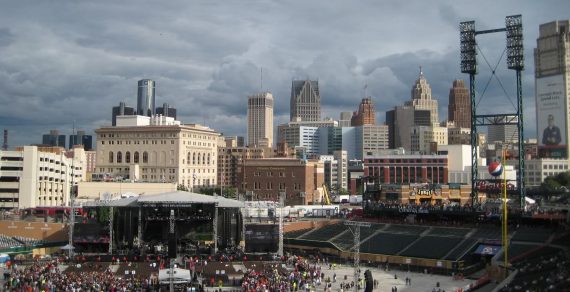Detroit Ruled Eligible For Chapter 9 Bankruptcy
A Federal Judge ruled today that the City of Detroit was indeed eligible to file for bankruptcy protection:
DETROIT — Detroit is eligible to shed billions in debt in the largest public bankruptcy ever in the United States, a federal judge ruled Tuesday, while also finding that the public pensions could be reduced during reorganization despite a provision in Michigan’s Constitution.
In ruling that Detroit was eligible to reorganize under federal bankruptcy law, Judge Steven W. Rhodes said the city met every test of insolvency, including failing to pay its debts and being unable to provide a minimum level of basic services to its 680,000 residents.
“This once proud and prosperous city can’t pay its debts,” the judge said. “It’s insolvent. It’s eligible for bankruptcy. But it also has an opportunity for a fresh start.”
Appeals were expected to be filed quickly. Bruce Babiarz, a spokesman for Detroit’s fire and police retirement system, which supports 8,500 retirees, said lawyers were reviewing the ruling and expected to file an appeal by the end of the week. But the case will continue to move forward, with the next step being the city filing a “plan of adjustment.” It is unclear, however, what portions of the judge’s ruling may be appealed.
Under the ruling, the vastly diminished city, once the nation’s fourth largest and the cradle of the American auto industry, will be allowed to search for a way to pay off some portion of its debts and to restore essential services to tolerable levels under court supervision. The goal, according to Kevyn Orr, an emergency manager appointed by the state of Michigan, is to emerge from court protection next year with a formal plan for starting over.
“Time is of the essence and we will continue to move forward as quickly and efficiently as possible,” Mr. Orr said Tuesday.
In his ruling, Judge Rhodes turned aside objections from unions, pension funds and retirees, which, like other creditors, could lose under any plan to solve $18 billion in long-term liabilities, including $3.5 billion in unfunded pension obligations. He also rejected arguments by unions and other opponents that the bankruptcy filing was the result of secret and unconstitutional decisions made by Gov. Rick Snyder of Michigan, who approved the filing in July, and others.
The filing makes Detroit the largest city in the nation’s history to take such a rare step. Most agreed the situation was dire: annual operating deficits since 2008, a pattern of new borrowing to pay for old borrowing, a shrunken population and tax base, and miserably diminished city services. But under federal bankruptcy provisions for municipalities, known as Chapter 9, a city first had prove its eligibility for protection before it could proceed with a plan to pay diminished sums to creditors.
The judge also rejected the notion that the city should not be eligible for Chapter 9 because the filing was a foregone conclusion.
“Yes of course it was,” Judge Rhodes said of the city’s eligibility for bankruptcy as he methodically went through the historic case during a hearing that lasted more than 90 minutes. “Individuals often wait longer to file for bankruptcy than is in their interest. And Detroit was no exception.”
One central argument from lawyers for the city’s public sector unions and retirees was that Detroit’s request for bankruptcy protection came before it had made good faith attempts to negotiate with creditors — mainly unions and retired city workers. But Judge Rhodes ruled that the size of Detroit’s debts and problems made it “impracticable” for Mr. Orr to negotiate concessions from creditors before recommending the Chapter 9 filing to Governor Snyder.
“It is impractical to negotiate with a stone wall,” was how the judge referred to the unions’ reticence to make concessions on the pension issue.
The judge made it clear that public employee pensions are not protected in a federal Chapter 9 bankruptcy — even though the Michigan Constitution expressly does protect them.
“Pension benefits are a contractual right and are not entitled to any heightened protection in a municipal bankruptcy,” he said.
Federal law, he said, trumps the state law — making the pensions of 23,000 workers fair game for the city to include in its plan of adjustment.
The main battles going forward, of course, will likely be between these public employee unions over the pension issue and the city, and between the city and bondholders. In both cases, the issue will be how much of a “haircut” both sets of creditors will be required to take in order to get to a point where the city can put together a viable plan that will allow it to emerge from Bankruptcy Court with at least somewhat of a chance of surviving going forward. With the Bankruptcy Code and the Court behind it, Detroit is going to have a good chance of winning those battles.
What will be interesting to watch going forward is whether Detroit’s move compels other financially troubled municipalities to follow suit and file for bankruptcy protection themselves. If Detroit is indeed successful in dealing with its pension issues in this manner, then one suspect the temptation for other cities to take the Chapter 9 path will be quite powerful.







We’re probably going to have to do something similar in Chicago, and I can’t think of anything better.
The problem is that no one has come up with any better solution. The only thing the politicians seem to be able to do is kick the football further down the road….where it’s going to be even worse.
Damn, does that mean I’m not going to get the $20 Detroit owes me?!
Another Republican victory in the ongoing war against the Middle Class.
Now watch as city after city renegs on their pension commitments.
And the wealthy…who are getting the tax cuts and the corporate welfare that drove the cities into bankruptcy…will continue to get wealthier.
And Doug will post more nonsense about technology and waitresses.
Should make for some interesting state and local races next year, might even pull some money and effort from the Congressional races.
@C. Clavin: Actually, the people who got Detroit into this mess vamoosed a long time ago.
Detroit seems to have been done in by a combination of collapse-of-the-auto-industry and long-term corruption.
Is it very clear that the federal law preempts the state constitution here? I would expect an appeal on this issue.
I would also hope this means that all public employee unions in Detroit strike. If their deferred compensation isn’t guaranteed, they should be demanding that compensation up front, at least going forward.
“Interesting” is a word that only a libertarian could use to describe this. It will be “interesting” to see if middle class workers are screwed out of their retirement plans and forced to live in poverty, indeed.
No question of what happens to those people, no concern for their welfare, just “interesting.”
For all of the progressives out there: What should Detroit do to fulfill all of the claims of the pensioners. Do you really want to give the corrupt politicians of Detroit an indefinite and unlimited claim on the tax dollars of the citizens of Michigan (or the rest of the U.S.) who do not live in Detroit. Why should other cities and states where there not as much corruption and not as much gold-plating of the contracts for their public sector workers pay higher taxes and have a lower level of city services so that Detroit can continue on its current course?
I would love to hear what progressives would go that goes beyond soundbites of MSNBC.
@superdestroyer: “I would love to hear what progressives would go that goes beyond soundbites of MSNBC.”
Sorry, SuperDull, but you have proven repeatedly that you are incapable of hearing anything that doesn’t match up with your race-terror based ideology. Why should anyone waste the time trying to explain reality to a man who is incapable of doing anything but repeating the same two or three sentences over and over and over and over again?
@wr:
I will take that as a now. No one wants to explain how Detroit can pay all of its current and future pensions using the current tax revenue of the City of Detroit. I guess progressives do not want to admit that what they really want to do is increase taxes on the rest of Michigan to pay off the public service unions.
Also, is progressives do not have snark or insults, they usually have nothing to say. Yet, those same progressives keep patting themselves on the back for being superintelligent, data driver, and reality-based.
@superdestroyer: Since Detroit won’t come through then we all will. At some point the screwed retiree qualifies for barebones SSI (~$700/mo) and Medicaid (possibly), some paid for by MI but the rest by the Federal government.
This is part of the don’t let the elderly dead accumulate in the street strategy that helps keep the pitchforks at bay. But don’t think stiffing these folks is going to save most Americans any money; it’s more shifting costs from Michigan to the rest of the country.
Indeed…while people like Doug and Superdestroyer would argue that the citizens of Michigan and the rest of the country shouldn’t have to bail out the obligations of Detroit, this bankruptcy move will do exactly that…
And I would imagine the picture inserted into this post is no accident…funny how Detroit can’t pay its employee obligations but it can fork over money for sports stadiums…
“Shut ‘er down”
I don’t know if it’s true, but supposedly the pension fund managers were also annually paying out any money they made as soon as they hit their yearly target for the fund. (Pounds head against wall.)